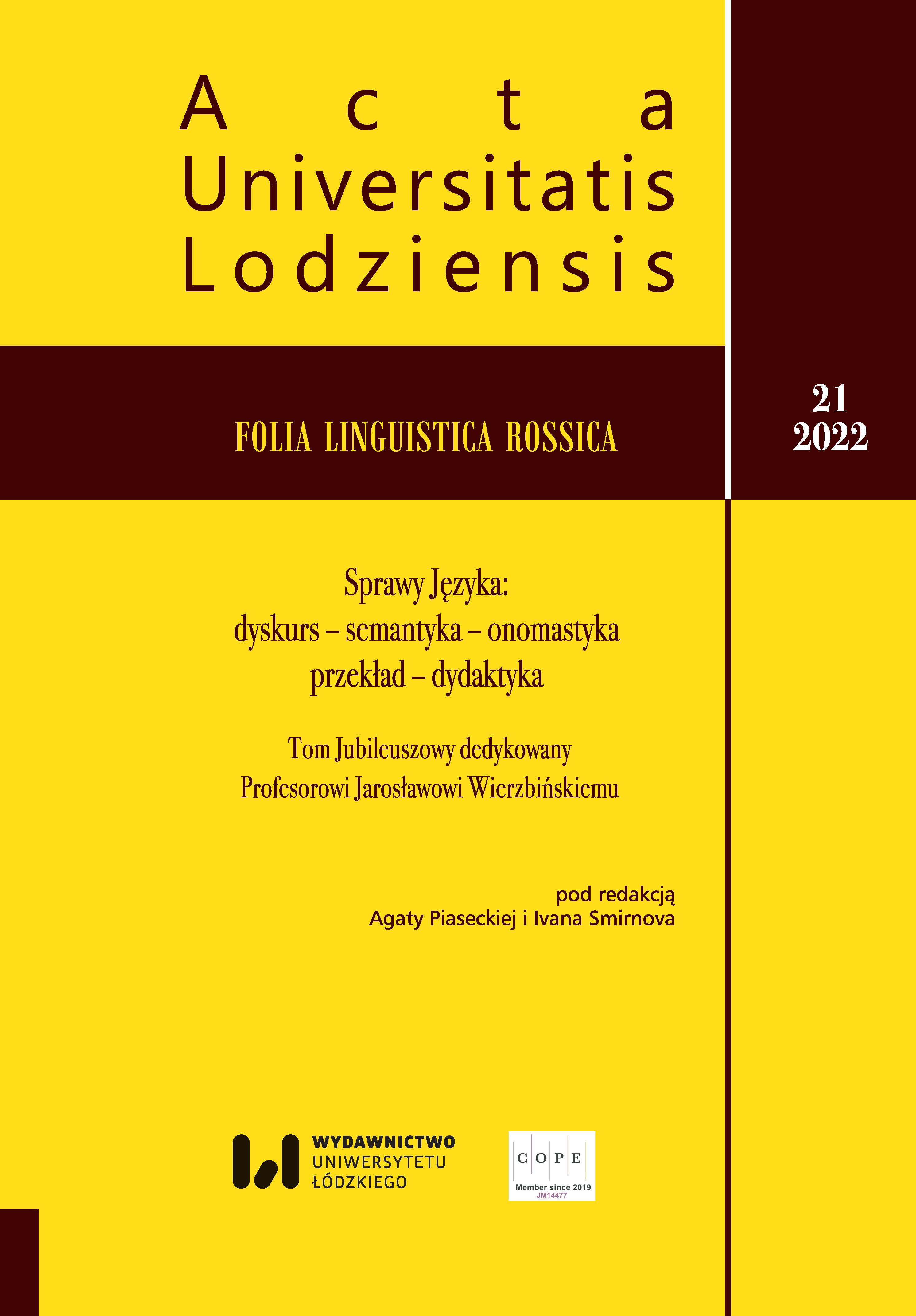Scientific Terminology in Technical Texts: Linguodidactic Aspect
DOI:
https://doi.org/10.18778/1731-8025.21.12Keywords:
scientific text, terminology, terminological field, competenceAbstract
In modern didactics, there is a theory of competent approach to teaching and teaching educational disciplines. The purpose of this article is to consider the formation of linguistic and professional competence among students when teaching terminological vocabulary of a non-native language on the material of technical specialty texts.
The communicative method regarded as the main method does not solve the problems of teaching the scientific style of a non-native language. Therefore, several approaches should be combined in teaching the professional Russian language: structural, aimed at assimilating the norms of the language, linguadidactic, representing methodological techniques, communicative, involving an understanding of the context, situation, competent, related to the connection of professional and linguistic knowledge, etc. Such multidimensional work with terminology contributes to the coverage of a large number of issues aimed at a detailed understanding of the scientific text and the role of terms. The formal organization of the scientific text is considered as a surface level that exposes the deep semantic level.
To implement the tasks of didactic, linguistic, pragmatic, text and tasks are presented in which general scientific and technical terms are used. Logical diagrams are proposed to be complied in order to test the ability to understand professionally-oriented text, vocabulary, and grammatical forms, retell texts by specialty and talk about professional topics. Work with the text is based on the native language and takes into account the terminology field, which is the text.
References
Вежбински, Я. (2017). Динамические процессы в лексическом корпусе современного русского языка, Наука. Мысль: электронный периодический журнал, 4, 67–74.
Google Scholar
Владимирова, Т.Л. (2010). Язык и стиль научного текста. Учебное пособие. Томск: Изд-во Томского политехнического университета.
Google Scholar
Гальперин, И.Р. (2008). Текст как объект лингвистического исследования. Москва: УРСС.
Google Scholar
Иваницкая, Е.В. (2016). Трансформация научного стиля в условиях меняющейся коммуникационной среды. Особенности современной научной статьи, Язык и текст, 3 (2), 62–75.
Google Scholar
DOI: https://doi.org/10.17759/langt.2016030207
Карлинский, А.Е. (2009). Методология и парадигмы современной лингвистики. Алматы: КазУМОиМЯ.
Google Scholar
Красильникова, Е.В. (2017). Обучение научному стилю речи в практике преподавания русского языка как иностранного, Вестник КГУ, 1, 193–195.
Google Scholar
Мирошкина, Н.Н. (2010). Формирование лингвостилистической компетенции студентов при изучении научного стиля, https://pglu.ru/upload/iblock/ae3/uch_2010_viii_00020.pdf, доступ: 3.05.2019.
Google Scholar
Нурмаханова, М.К. (2014). Русский язык для бакалавриата всех специальностей. Учебное пособие. Алматы: АУЭС.
Google Scholar
Писарева, С.А. (2005). Качество современного диссертационного исследования по педагогике: методология оценки. Автореф. дис.…докт. пед. наук. Санкт-Петербург.
Google Scholar
Усольцев А.А. (2013). Электрические машины. Учебное пособие. Санкт-Петербург: СПбНИУ ИТМО.
Google Scholar
Чернявская, В.Е. (2007). Интерпретация научного текста. Москва: УРСС.
Google Scholar
Шайбакова, Д.Д. (2016). Модели организации билингвального образования, Педагогика и психология. КазНПУ им. Абая, 2, 28–35.
Google Scholar
Chernyavskaya, V.E. (2007). Interpretatsiya nauchnogo teksta. Moscow: URSS.
Google Scholar
Gal’perin, I.R. (2008). Tekst kak ob”ekt lingvisticheskogo issledovaniya. Moscow: URSS.
Google Scholar
Ivanitskaya, E.V. (2016). Transformatsiya nauchnogo stilya v usloviyakh menyayushcheisya kommunikatsionnoi sredy. Osobennosti sovremennoi nauchnoi stat’i, Yazyk i tekst, 3 (2), 62–75.
Google Scholar
Karlinskii, A.E. (2009). Metodologiya i paradigmy sovremennoi lingvistiki. Almaty: KazUMOiMYa.
Google Scholar
Krasil’nikova, E.V. (2017). Obuchenie nauchnomu stilyu rechi v praktike prepodavaniya russkogo yazyka kak inostrannogo, Vestnik KGU, 1, 193–195.
Google Scholar
Miroshkina, N.N. (2010). Formirovanie lingvostilisticheskoi kompetentsii studentov pri izuchenii nauchnogo stilya, https://pglu.ru/upload/iblock/ae3/uch_2010_viii_00020.pdf accessed: 3.05.2019.
Google Scholar
Nurmakhanova, M.K. (2014). Russkii yazyk dlya bakalavriata vsekh spetsial’nostei. Uchebnoe posobie. Almaty: AUES.
Google Scholar
Pisareva, S.A. (2005). Kachestvo sovremennogo dissertatsionnogo issledovaniya po pedagogike: metodologiya otsenki. Avtoref. dis.…dokt. ped. nauk. St. Petersburg.
Google Scholar
Shaibakova, D.D. (2016). Modeli organizatsii bilingval’nogo obrazovaniya, Pedagogika i psikhologiya. KazNPU im. Abaya, 2, 28–35.
Google Scholar
Usol’tsev A.A. (2013). Elektricheskie mashiny. Uchebnoe posobie. St. Petersburg: SPbNIU ITMO.
Google Scholar
Vezhbinski, Ya. (2017). Dinamicheskie protsessy v leksicheskom korpuse sovremennogo russkogo yazyka, Nauka. Mysl’: elektronnyi periodicheskii zhurnal, 4, 67–74.
Google Scholar
Vladimirova, T.L. (2010). Yazyk i stil’ nauchnogo teksta. Uchebnoe posobie. Tomsk: Izd-vo Tomskogo politekhnicheskogo universiteta.
Google Scholar
Andrews, T., Prys, Gr. (2016). Terminology Standardization in Education and the Construction of Resources: The Welsh Experience, https://files.eric.ed.gov/fulltext/EJ1116863.pdf accessed: 3.05.2019.
Google Scholar
Cabre, M.T. (1998). Terminology: Theory, Methods and Applications. Philadelphia PA: John Benjamins Publishing Company.
Google Scholar
Justeson, J.S., Katz, S.M. (1995). Technical terminology: some linguistic properties and an algorithm for identification in text, Natural Language Engineering, 1, 9–27 https://doi.org/10.1017/S1351324900000048.
Google Scholar
DOI: https://doi.org/10.1017/S1351324900000048
Mazurkevich-Sulkovska, J. (2014). Skomplikowane terminy w bułgarskiej, rosyjskiej i polskiej terminologii technicznej (29–39). Łódź: Pictor.
Google Scholar
McCord, Michael C. (1990). Slot grammar: a system for simpler construction of practical natural language grammars. In: Natural Language and Logic: International Scientific Symposium. Lecture Notes in Computer Science (118–45), R. Studer (ed.), Berlin: Springer Verlag https://doi.org/10.1007/3-540-53082-7_20
Google Scholar
DOI: https://doi.org/10.1007/3-540-53082-7_20
Pustejovsky, J, Boguraev, B. (1993). Lexical knowledge representation and natural language processing, Artificial Intelligence, 63, 193–223, https://doi.org/10.1016/0004-3702(93)90017-6
Google Scholar
DOI: https://doi.org/10.1016/0004-3702(93)90017-6
Salton, G. (1988). Syntactic approaches to automatic book indexing. Proceedings of the 26th Annual Meeting of the Association for Computational Linguistics. State University of New York at Buffalo, 204–210, https://aclanthology.org/P88-1025.pdf, accessed: 3.05.2019 https://doi.org/10.3115/982023.982048
Google Scholar
DOI: https://doi.org/10.3115/982023.982048
Salton, G., Zhao, Zh., Buckley, Ch. (1990). A simple syntactic approach for the generation of indexing phrases. Technical Report. Department of Computer Science, Cornell University.
Google Scholar
Downloads
Published
How to Cite
Issue
Section
License

This work is licensed under a Creative Commons Attribution-NonCommercial-NoDerivatives 4.0 International License.









